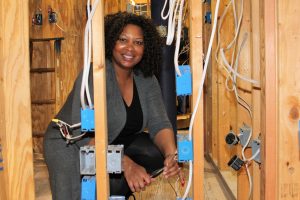
The construction technology lab area at the North Lake College West Campus is a bustling, warehouse-sized building teeming with students, practicing their skills in different areas of the program.
The level of activity in the building almost overloads the senses, from bright lights created by students who are practicing welding…to noises originating from electrical machines…to student electricians discussing how to wire a structure…to heating, ventilation, air conditioning and refrigeration (or HVAC) students starting an AC unit or a furnace.
The vast majority of students in the construction technology program already work in the industry. However, many of them hope that the extra education and training will give them a leg up advancing in their companies and also will improve their financial futures, according to Tom Hoops, an electrical technology instructor at North Lake.
“They’re not just laborers,” Hoops said. “They want to move into management, or they want to become foremen or supervisors. They learn theory in class; then they come to the lab and physically apply what they’ve learned.”
Hoops, who owned an electrical service company before he became an instructor, said a degree can make the difference when a company interviews people for jobs. “When I had a business,” Hoops said, “I looked at the person who had completed something. A degree was an ace-in-the-hole for someone who wanted to move up.”
Construction employment boom is coming
Employment in all areas of construction is expected to grow by 27 percent by 2024 in North Texas, according to the Texas Workforce Commission, and that growth could skyrocket, if plans for $1 trillion in national infrastructure spending become a reality. The employment surge affects all areas of construction, from electricians to plumbers to carpenters and from brick masons to carpenters, according to TWC.
Figures from TWC reveal that electrical jobs are expected to grow by 28 percent in the Dallas area; for HVAC employees, it’s 29 percent; for carpenters, it’s 22 percent. And these are high-paying jobs, too. The annual mean wage for an HVAC worker in Texas, for example, is almost $43,000. For an electrician, it’s almost $46,000.
Construction worker shortage: a critical situation
The construction industry has been hammered by a national shortage of skilled construction workers. The Associated General Contractors of America said in a January 2017 statement that the scarcity of experienced workers kept contractors “from adding more” employees.
The situation is particularly urgent in North Texas, where area home builders have been slowed by a lack of skilled workers. “The problem is getting worse,” said Michael Cooley, dean of the construction program at North Lake, who recently discussed the issue with his counterparts at other colleges and universities.
“Based on my conversations with other institutions, our problem here in Dallas is reflected across the country,” Cooley added. “The scarcity of skilled personnel exists not only for crafts people but also for construction management personnel. It’s a bad situation.”
The situation, while bad for the industry as a whole, has created opportunities for advancement and better pay for students in the program. The AGC said in another news release that employers already are raising wages to fill openings.
Different goals for different situations and students
Students in the construction technology program have a wide range of goals and reasons to take classes at North Lake. Those reasons vary from advancing within their companies to becoming entrepreneurs to increasing their personal knowledge.
James Arteno, a superintendent at DynaTen, a mechanical systems company, is studying HVAC systems. He said he hopes the extra training will open up opportunities for him. “I want to move forward in my company,” Arteno said. “I’m doing my certification in HVAC, and I want to go into management, so I’ve taken construction management classes here, too.”
Arteno won a local competition in the HVAC craft late last year, and he then represented the school and its partner, the Construction Education Foundation of North Texas, during the National Craft Championship in Fort Lauderdale, Florida.
Juah Davis Davila, an electrical technology student who already has a master’s degree in an unrelated field, owns a couple of residential housing units for seniors with her husband, Ivan Davila. She said she’s taking classes to acquire a foundation in electrical work for a future solar energy company that she and her husband plan to launch.
“I’m originally from Liberia, where many people use gasoline and diesel for generators,” she explained. “We want to start a solar electricity company in areas like Africa or in the Caribbean, or any area where electricity is not consistent or is too expensive.”
More hands-on experience helps more students
Jordi Lopez, who is working on his associate degree, said he eventually would like to become an architect, but he plans to stay with his current employer, Capform Construction, where he works as a field engineering assistant.
“I want to learn all about field engineering while I’m here,” Lopez said. “After that, I’ll work my way up to civil engineering, then architecture. I want to be the guy who does the drawings for new buildings, so a bachelor’s degree is in the cards for me.”
Carlos Martinez, who works for a general contractor in Dallas, said he’s taking field engineering classes and learning how to use a total station because he wants to learn a new skill that will lead to better pay. “I like being hands-on and knowing what’s happening in a project from start to finish,” Martinez stated.
Martinez added that people who work in construction need to be smart and can’t rely on modern, computerized equipment which can figure out all of the calculations and measurements.
“You have to know a lot of math,” he said. “We don’t want dummies. Companies don’t want to hire people who don’t know how to use expensive equipment, like a total station, which can cost thousands of dollars.”




